

Penguin Random House Open License Online Story Time and Classroom Read-Aloud Videos and Live Events. LICENSE EXTENDED TO JUNE 30th, 2021 In order to encourage reading and classroom read-aloud experiences, and to support schools and public libraries forced to close by the escalating COVID-19 outbreak, Penguin Random House is permitting teachers, educators, librarians, booksellers, and other qualified individuals to create and share story time and read-aloud videos and live events, according to the following guidelines which have been extended to June 30th, 2021.
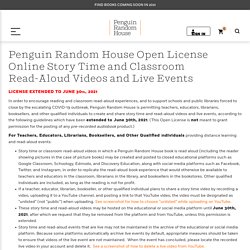
(This Open License is not meant to grant permission for the posting of any pre-recorded audiobook product.) Professional Development : Copyright & Creativity. Our free professional development course is hosted on Canvas, where educators can earn the C&C Copyright Ethics badge.
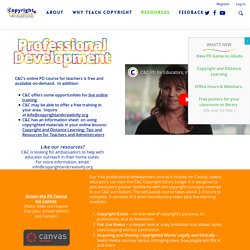
It is designed to give educators greater familiarity with the copyright concepts covered in our C&C curriculum. The self-paced course takes about 2-3 hours to complete. It consists of a short introductory video plus five learning modules: Columbia University Libraries. Copyright - Course Reserves - Library Guides at Iowa State University. Understanding copyright issues is not always easy.
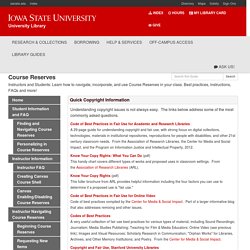
The links below address some of the most commonly asked questions. Code of Best Practices in Fair Use for Academic and Research Libraries A 29-page guide for understanding copyright and fair use, with strong focus on digital collections, technologies, materials in institutional repositories, reproductions for people with disabilities, and other 21st century classroom needs. From the Association of Research Libraries, the Center for Media and Social Impact, and the Program on Information Justice and Intellectual Property, 2012.
Know Your Copy Rights: What You Can Do (pdf) This handy chart covers different types of works and proposed uses in classroom settings. From the Association of Research Libraries (ARL). Know Your Copy Rights (pdf) This fuller brochure from ARL provides helpful information including the four factors you can use to determine if a proposed use is "fair use. " U.S. Your question isn't covered here? The Purpose of Copyright. Lydia Pallas Loren The newspaper you read this morning, the television show you watched last night, the movie you are going to see this weekend, the computer software you use to prepare your letters or send your email, the music you listen to in the car on your way to work: they are all copyrighted.
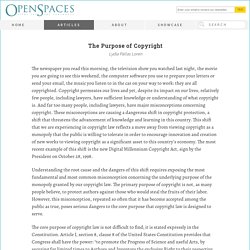
Copyright permeates our lives and yet, despite its impact on our lives, relatively few people, including lawyers, have sufficient knowledge or understanding of what copyright is. And far too many people, including lawyers, have major misconceptions concerning copyright. These misconceptions are causing a dangerous shift in copyright protection, a shift that threatens the advancement of knowledge and learning in this country. Understanding the root cause and the dangers of this shift requires exposing the most fundamental and most common misconception concerning the underlying purpose of the monopoly granted by our copyright law.
A Quick Trip Back in History. Codes of Best Practice, American University. Fair Use - Copyright - LibGuides at Butler Community College. Fair use (17 U.S.C. §107) helps BALANCE the rights of copyright owners with copyright users.
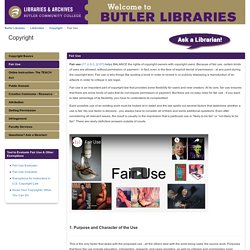
Because of fair use, certain kinds of uses are allowed, without permission or payment - in fact, even in the face of explicit denial of permission - at any point during the copyright term. Fair use is why things like quoting a book in order to review it, or publicly displaying a reproduction of an artwork in order to critique it, are legal. Fair use is an important part of copyright law that provides some flexibility for users and new creators. At its core, fair use ensures that there are some kinds of uses that do not require permission or payment. But there are no easy rules for fair use - if you want to take advantage of its flexibility, you have to understand its complexities! Each possible use of an existing work must be looked at in detail and the law spells out several factors that determine whether a use is fair. 1. 2.
One element of this factor is whether the work is published or not. School Library Journal. The 24th annual World Book and Copyright Day celebrates reading around the world and the contributions of books as an ally in education and the progress of humanity.
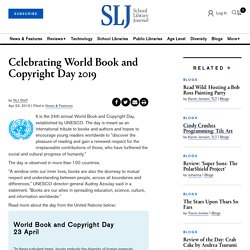
It is the 24th annual World Book and Copyright Day, established by UNESCO. The day is meant as an international tribute to books and authors and hopes to encourage young readers worldwide to "discover the pleasure of reading and gain a renewed respect for the irreplaceable contributions of those, who have furthered the social and cultural progress of humanity.
" The day is observed in more than 100 countries. "A window onto our inner lives, books are also the doorway to mutual respect and understanding between people, across all boundaries and differences," UNESCO director-general Audrey Azoulay said in a statement. Cb copyright.